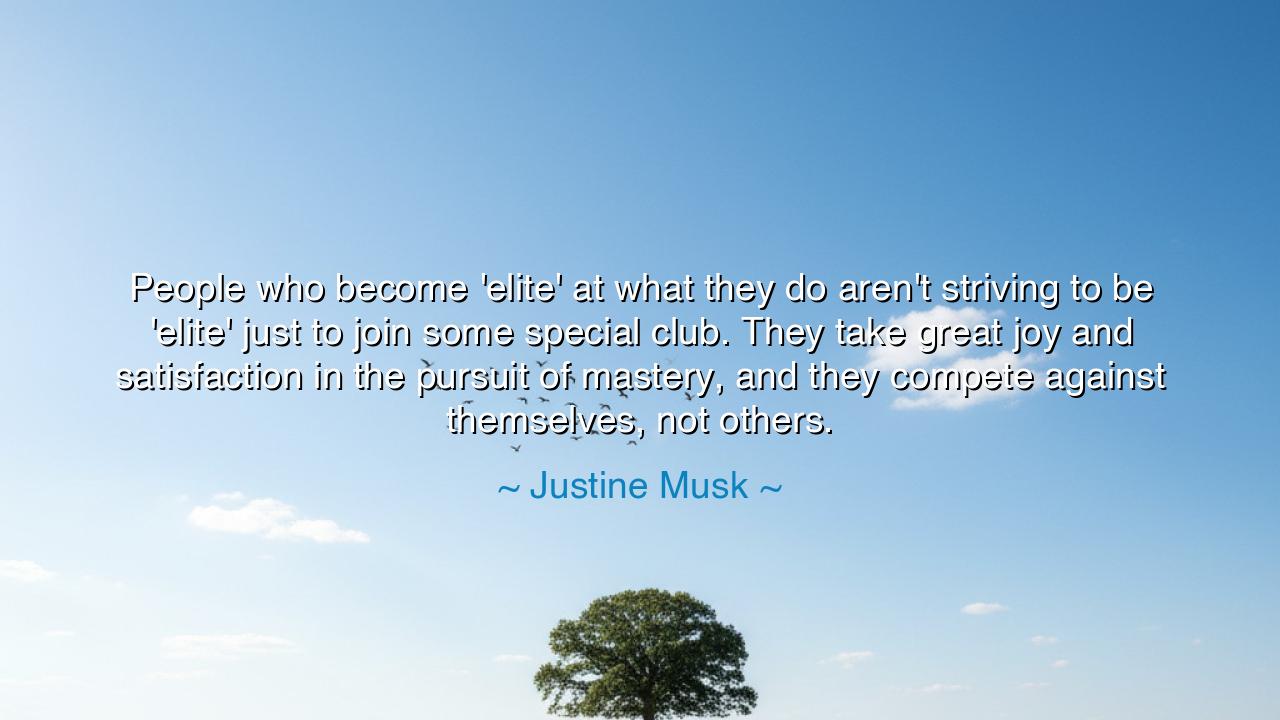
People who become 'elite' at what they do aren't striving to be
People who become 'elite' at what they do aren't striving to be 'elite' just to join some special club. They take great joy and satisfaction in the pursuit of mastery, and they compete against themselves, not others.






“People who become ‘elite’ at what they do aren’t striving to be ‘elite’ just to join some special club. They take great joy and satisfaction in the pursuit of mastery, and they compete against themselves, not others.” Thus spoke Justine Musk, a writer of deep perception and insight into the human spirit. Her words pierce the illusions of ambition and pride, reminding us that true greatness is not born from comparison, but from devotion — the sacred striving of the soul toward mastery. In an age where the world glorifies achievement and ranks success by titles and trophies, Musk’s wisdom calls us back to the ancient understanding: that the noblest pursuit is the perfection of the self, not the conquest of others.
To the ancients, this truth was the very essence of virtue. The philosopher Aristotle spoke of arete — excellence — as the highest aim of life, not as a badge to display, but as a way of being. The warrior, the craftsman, the poet — all sought to master their art not for applause, but because in mastery, they touched the divine. The archer did not compete to defeat his rival; he drew his bow to steady his own hand, to calm his own mind. The victory that mattered was not in the arena, but within the heart. So too does Justine Musk speak of those who are truly “elite”: not those who crave fame or status, but those who are so consumed by their craft that the work itself becomes their reward.
She speaks from a place of understanding — of watching closely those who rise to greatness, not through privilege, but through discipline, obsession, and inner fire. In her words is the echo of those who have walked this path before: the artist who paints through the night for no audience, the scientist who repeats the same experiment a hundred times seeking truth, the athlete who trains long after the world has gone to sleep. For such people, the pursuit is not a means to an end; it is the end itself. They live not for recognition, but for the quiet joy of creation, for the moment when effort and essence become one.
History gives us shining examples of this truth. Consider Leonardo da Vinci, who spent his life not chasing titles or fame, but knowledge. He dissected corpses to study the miracle of anatomy, observed birds for the secret of flight, and filled his journals with sketches never meant for the public eye. His genius was not driven by the desire to be “elite,” but by the love of understanding. And in that love, he became what others would later call a genius. So it is with all who achieve greatness — mastery is a byproduct of passion, not ambition. The true competitor is not the rival across the field, but the self of yesterday.
Even the Stoic philosophers, those guardians of inner wisdom, taught that the highest form of competition was against one’s own weakness. The wise man does not ask, “How do I surpass others?” but “How do I surpass myself?” For in the struggle against one’s fears, laziness, and doubt lies the true battlefield of life. Justine Musk’s words are an echo of this timeless philosophy — that the elite are not made by the world’s approval, but by their inner resolve to refine their character, their craft, and their soul. The one who seeks mastery over self inevitably rises, while the one who seeks mastery over others is bound by envy and exhaustion.
There is a quiet joy in this path — a joy that no external validation can provide. It is the joy of the musician who loses herself in melody, the writer who feels words pour from some sacred place within, the athlete who finds peace in the rhythm of movement. These are moments when the self dissolves, when action and being become one — the state the ancients called flow, or the Taoists named wu wei: effortless effort, divine harmony. Those who pursue such mastery are not chasing glory; they are living truth. Their satisfaction lies not in triumph over others, but in the realization that they have become what they were meant to be.
So, my friend, let this be your lesson: do not seek to be “elite” — seek to be whole. Do not measure your worth by the applause of the crowd, but by the quiet progress of your own becoming. Each day, strive not to defeat another, but to rise above who you were the day before. Work not for prestige, but for excellence; not for recognition, but for growth. If you pour your spirit into the pursuit of mastery, greatness will follow as naturally as dawn follows night.
And when that moment comes — when your craft sings through you and your heart beats in harmony with your purpose — you will understand what Justine Musk meant. You will feel that great joy and satisfaction of living fully in your element, of striving not to belong to an “elite,” but to belong to yourself. For the highest victory is not over the world, but over one’s own limitations. And in that victory, you will find not pride, but peace — the quiet, eternal triumph of mastery.






AAdministratorAdministrator
Welcome, honored guests. Please leave a comment, we will respond soon